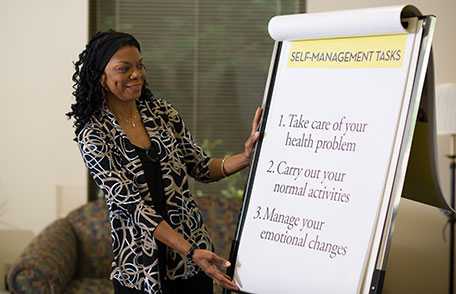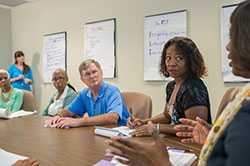Help for Arthritis in Rural Areas

October 12 is World Arthritis Day. In honor of the observance, CDC focuses on how self-management education workshops and physical activity programs help adults with arthritis, including those in rural and other underserved communities, manage or relieve pain and improve their health.
CDC research finds that one-third of adults in the most rural areas in the United States have arthritis, which includes more than 100 conditions that affect the joints, tissues around the joint, and other connective tissues. Specific symptoms vary depending on the type of arthritis, but usually include joint pain and stiffness. More than one-half of adults with arthritis are limited in their everyday activities by the condition.
Arthritis has a profound economic, societal and personal impact. Medical care costs and earnings losses among adults with arthritis were $304 billion in 2013. Medical care costs include prescriptions. In 2013, US adults with arthritis comprised more than half (53%) of all US adults taking prescribed opioids.
However, adults with arthritis can reduce or better manage their symptoms—including pain—by participating in arthritis or chronic disease self-management education workshops—like the Chronic Disease Self-Management Program (CDSMP).
These programs can help you move more freely, and improve mood and general quality of life. While offering programs in rural areas can be challenging, some CDC-supported state programs are overcoming the challenges of starting workshops in rural areas and improving the health and hope of those with arthritis who come to the workshop.
Kentucky
In the mostly rural state of Kentucky, more than one million adults, or over 30% of the state’s adult population, have arthritis. The Kentucky Department of Health’s Arthritis Program, funded by CDC, is partnering with the Homeplace program at the University of Kentucky Center of Excellence in Rural Health. They are working together to train community health workers to offer the CDSMP workshops in Appalachian communities. Community health workers are ideal workshop leaders because they are often well known, trusted in their community, and are very familiar with potential barriers to healthy living in that area.
These workshops occur in community settings such as senior centers, churches, libraries, and hospitals. The free workshops are facilitated by two trained community leaders, one or both of whom have a chronic disease themselves.

A group of people attending a self-management education workshop.
The workshops cover a variety of topics including:
- Pain and fatigue management
- How to make an action plan to set and achieve attainable goals
- Problem solving
- How to deal with difficult feelings
- Physical activity/exercise
- How to make decisions
- Healthy eating
- Communication skills
- Working with your health care professional
Those in the workshop meet 2 1/2 hours per week for 6 weeks. We know that people who took the Chronic Disease Self-Management Program (CDSMP) had significant improvements in exercise, ability to do social and household activities, less depression, fear and frustration or worry about their health, reduction in symptoms like pain, and increased confidence in their ability to manage their arthritis and other chronic conditions.
Kansas
In the heart of the United States, the Kansas Department of Health and Environment’s Arthritis Program is funded by CDC and offers CDSMP workshops in five rural counties in the northeast corner of the state. The state works with the Northeast Kansas Environmental Services’ Chronic Disease Risk Reduction program to offer the workshops. These counties have some of the highest rates of arthritis in the state, affecting up to 1 in 3 people in the hardest hit areas.
With limited resources and long distances to travel, Northeast Kansans face unique challenges when it comes to accessing health care and community services. Fortunately, the area has a handful of champions who devote their time to help people who live with arthritis and other chronic conditions develop the skills they need to manage their health challenges. These champions lead CDSMP workshops.
For example, in Reserve, KS, located in Brown County on the Sac and Fox Native American reservation, the health clinic provides transportation for its patients to attend the workshop each week, making it easier to receive services. Audrey Boos, CDSMP leader and registered nurse believes that CDSMP workshops are well-received by members of the rural community. “Residents of rural communities like to help themselves and often see it as necessary because of the lack of resources,” she said. “These workshops empower people to be active participants and problem solvers in their own health care.”
Utah
To the west, the Utah Department of Health’s Arthritis Program , which is also funded by CDC, currently works with community organizations—HealthInsight, Intermountain Healthcare, and the Central Utah Department of Health—to offer the CDSMP program, which they have re-branded as ” Living Well,” in select rural and frontier counties.
Registration for the workshops is easy as the Utah Department of Health maintains a web portal where residents can register for and learn more about the Living Well workshops, including locations of classes.
Starting Living Well workshops in Utah and reaching rural areas is particularly important as the state has fewer cities, and approximately 408,000 adults or 20% of the state’s adult population have arthritis. Of those adults with arthritis, 45% are limited in their everyday activities because of the disease. In addition, those in rural and frontier settings often have significantly less access to healthcare services.
Physical Activity and Other CDC Recommended Programs
Along with the CDSMP/Living Well workshops, CDC recommends a variety of community-based programs for adults with arthritis, focusing on both self-management education and physical activity.
CDSMP/Living Well workshops are available throughout the United States. Also, self-directed, non-group options are available for multiple arthritis-friendly proven self-management education or physical activity programs.
Physical activity can reduce pain, improve function, mood, and quality of life for adults with arthritis. Physical activity is a simple and effective, non-drug way to relieve pain from arthritis. Physical activity community programs—like Enhanced Fitness, Walk With Ease, and others—help adults with arthritis be healthier. They are often held in community parks, Ys (YMCAs), and other community venues.
Regular physical activity can have many benefits for people with arthritis without making symptoms worse. Recommended activities include walking, biking, swimming, and water aerobics. These non-drug ways to eliminate or manage arthritis pain can help people take control of their health and are the basics of the proven programs recommended by CDC.
- Page last reviewed: October 12, 2017
- Page last updated: October 12, 2017
- Content source:
- National Center for Chronic Disease Prevention and Health Promotion, Division of Population Health
- Page maintained by: Office of the Associate Director for Communication, Digital Media Branch, Division of Public Affairs




 ShareCompartir
ShareCompartir